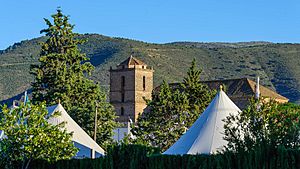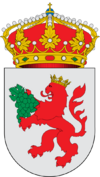Padules facts for kids
Quick facts for kids
Padules, Spain
|
|||
|---|---|---|---|

The cathedral of Santa María la Mayor
|
|||
|
|||
| Country | Spain | ||
| Community | Andalusia | ||
| Municipality | Almería | ||
| Area | |||
| • Total | 27 km2 (10 sq mi) | ||
| Elevation | 754 m (2,474 ft) | ||
| Population
(2018)
|
|||
| • Total | 419 | ||
| • Density | 15.52/km2 (40.2/sq mi) | ||
| Time zone | UTC+1 (CET) | ||
| • Summer (DST) | UTC+2 (CEST) | ||
Padules is a small and charming town located in the Almería province of southern Spain. It is part of the beautiful region called Andalusia. This quiet municipality is known for its peaceful atmosphere and lovely natural surroundings.
Contents
About Padules
Padules is a small community nestled in the mountains. It covers an area of about 27 square kilometers (about 10 square miles). The town is located at an elevation of 754 meters (about 2,474 feet) above sea level. This high location offers great views of the surrounding landscape.
Location in Spain
Padules is found in the southeastern part of Spain. It is part of the larger Andalusia region. This area is famous for its sunny weather and rich history. Being in Almería province means Padules is close to both mountains and the Mediterranean Sea.
Local Government
Like all towns, Padules has a local government. The town is led by a Mayor. The current mayor is Antonio Gutiérrez Romero. He is a member of the PSOE. The mayor and the local council work to manage the town and serve its residents.
Population of Padules
Padules is a very small town. In 2018, its population was around 419 people. This makes it one of the smaller municipalities in the region. The number of people living in Padules has changed over the years.
Historical Population Trends
Looking at past numbers helps us understand how the town has grown or shrunk. Here is a quick look at the population of Padules over some years:
| Historical population | ||
|---|---|---|
| Year | Pop. | ±% |
| 1999 | 491 | — |
| 2000 | 481 | −2.0% |
| 2001 | 475 | −1.2% |
| 2002 | 466 | −1.9% |
| 2003 | 449 | −3.6% |
| 2004 | 455 | +1.3% |
| 2005 | 504 | +10.8% |
| Source: INE (Spain) | ||
As you can see, the population has varied. It was around 491 people in 1999 and went down to 449 in 2003. By 2005, it had increased to 504. These changes show how small towns can see their populations go up and down over time.
Images for kids
See also
 In Spanish: Padules para niños
In Spanish: Padules para niños
 | Georgia Louise Harris Brown |
 | Julian Abele |
 | Norma Merrick Sklarek |
 | William Sidney Pittman |





